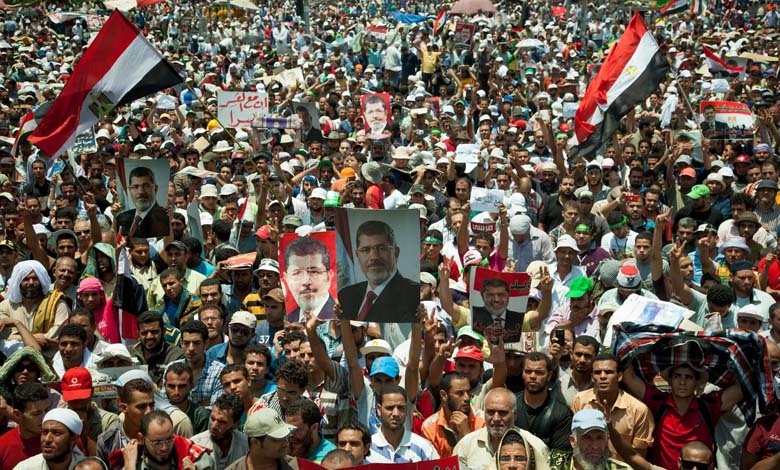After 11 Years of Falling: How the Muslim Brotherhood Turned into a Fragmented Entity Fighting for Leadership

Eleven years after the fall of the Muslim Brotherhood‘s rule in Egypt, the organization is now facing a real existential crisis. Internal divisions and leadership struggles have significantly diminished its influence on the political scene. Once a powerful force in Egyptian politics, the organization is now a collection of fragments fighting among themselves for power, reflecting the decline of an entity that posed a significant threat to Egypt’s stability during its brief period in power.
Popular Revolution
On the morning of June 30, 2013, Egypt woke up to a massive popular revolution that overthrew the Muslim Brotherhood regime led by former President Mohamed Morsi. This revolution was the result of a year-long buildup of popular discontent under the Brotherhood’s rule, marked by numerous political and social crises.
The rise of the Muslim Brotherhood in Egypt began after the 2011 revolution that ousted former President Hosni Mubarak. The Brotherhood managed to exploit the political vacuum and popular mobilization in the name of religion, enabling them to win the presidential elections with Mohamed Morsi as their candidate. However, within just one year of their rule, Egypt became a stage for unrest and internal conflicts, leading the people to revolt against them.
After Their Fall
Following the overthrow of the Brotherhood regime, its members were scattered between those imprisoned in Egypt and those who fled abroad, particularly to Turkey. Others joined various terrorist organizations, which the Egyptian army faced vigorously in Sinai.
The shock was immense for the Brotherhood, which lost its key leaders, with most members of the Guidance Bureau in Cairo arrested on charges of terrorism and collaboration.
Internal conflicts within the Brotherhood did not cease after their fall but intensified, leading to the formation of two main factions vying for leadership: the London faction and the Istanbul faction.
Even after 11 years, this struggle has not ended, leading to the fragmentation of the Brotherhood’s organizational structure. Successive blows have caused the organization to lose its direction and turn into a fragmented entity lacking central leadership.
A Fragmented Organization
According to Samih Eid, after 11 years, the Muslim Brotherhood has become two factions disputing leadership.
Eid adds that the Brotherhood has transformed from a central entity operating in Egypt to a dispersed organization present in safe haven countries abroad, noting that this transformation has negatively impacted the organization’s credibility and revealed the corrupt face of its leaders, who are mutually accused of corruption and theft.
In the same context, researcher Mostafa Hamza believes that the Brotherhood lost their reason after the revolution and insisted on clashing with everyone, including their own members. Hamza adds that the Brotherhood‘s attempts to return to power have repeatedly failed, noting that the recent Egyptian-Turkish reconciliation threatens their presence in Turkey, which strengthens the collapse of the Brotherhood after 11 years of their fall.
Hamza said that the Brotherhood’s collapse was not surprising but a natural consequence of authoritarian policies and the failure to meet the people’s aspirations. Furthermore, internal conflicts and leadership disputes significantly contributed to the Brotherhood’s fragmentation. The future of the Brotherhood looks uncertain under these conditions.
The past ten years have shown that the Muslim Brotherhood is no longer that strong, cohesive entity that boasted of its ability to influence and control. They have become a collection of dispersed names and personalities suffering from internal conflicts and external pressures, their memories confined to the dark pages of history. They no longer have a real presence on the Egyptian political scene or even at the level of the international organization. Thus, we can say that “the Muslim Brotherhood is currently experiencing a phase of disintegration and fragmentation after a decade of their fall.”
-
Researcher in Islamic Movements: The Muslim Brotherhood betrayed Egypt and the Palestinian cause
-
The Muslim Brotherhood penetrated universities and all institutions in Egypt in 2011
Leadership struggles, accusations of corruption, and internal conflicts have rendered the Brotherhood a fragile entity incapable of returning to its former state. They have transformed from an influential force into a group of scattered individuals who have lost their purpose and direction.












